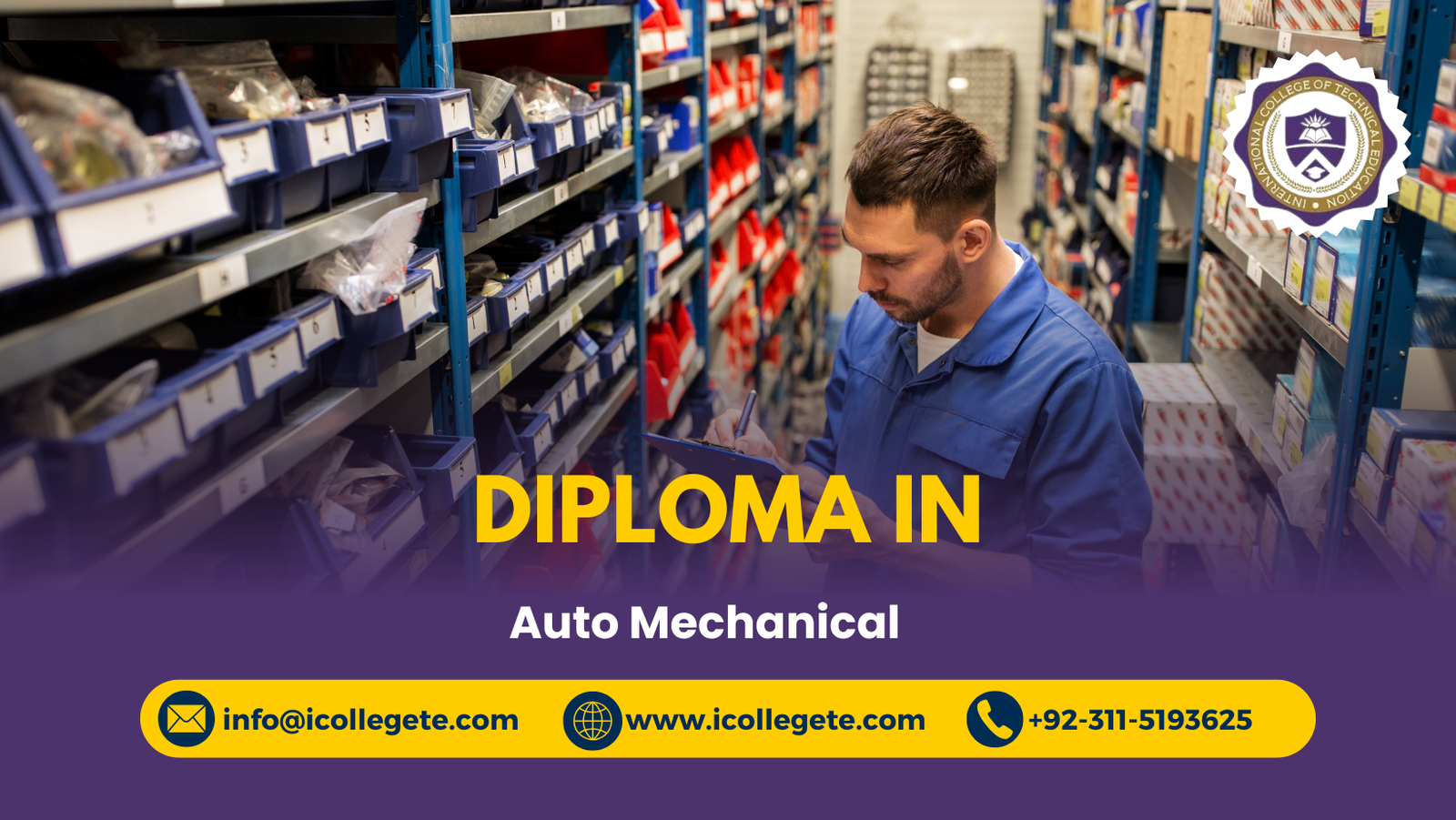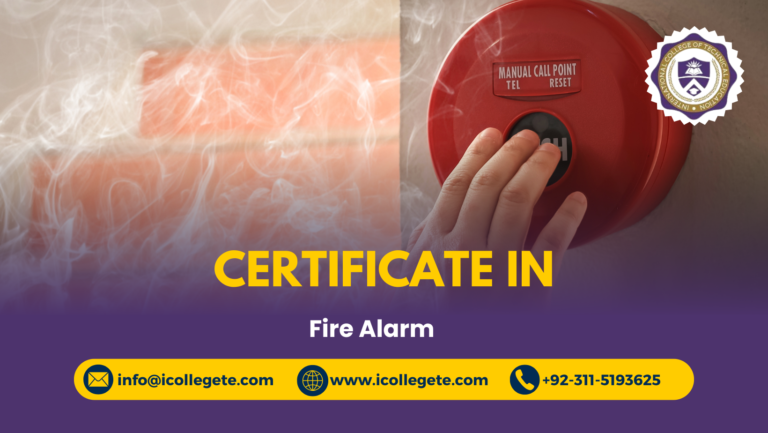Unlock the skills to diagnose, repair, and maintain vehicles with our Auto Mechanic Course in Rawalpindi, a hands-on training program designed for aspiring automotive technicians. Auto Mechanic Course in Rawalpindi provides a practical foundation in modern vehicle systems, empowering learners to work confidently in garages, workshops, and service centers across Pakistan and beyond.
Delivered by experienced instructors, the Auto Mechanic Course in Rawalpindi covers essential areas such as engine diagnostics, electrical systems, brake and suspension repair, fuel systems, and routine maintenance procedures. Learners gain real-world experience through guided practice, tool handling, and scenario-based exercises that simulate actual workshop conditions.
Ideal for beginners and those looking to upgrade their technical skills, Auto Mechanic Course in Rawalpindi requires no prior experience and is structured to be accessible and career-focused. Whether you’re planning to join an auto repair shop, start your own garage, or pursue employment abroad, the training equips you with the competencies needed to succeed in the automotive industry.
Located in Rawalpindi, our training facility offers flexible schedules, modern equipment, and certification upon completion. Participants will leave with the ability to inspect, service, and repair a wide range of vehicles, from motorcycles to light-duty cars. Enroll today to begin your journey toward becoming a certified auto mechanic and take advantage of growing opportunities in vehicle maintenance and repair.
Course Overview
The Auto Mechanic Course in Rawalpindi is a foundational-level technical training program designed to introduce learners to the core systems and components of modern vehicles. Structured for practical learning, the course emphasizes hands-on experience and workshop readiness, making Auto Mechanic Course in Rawalpindi ideal for individuals seeking entry into the automotive repair industry.
The curriculum is divided into six specialized study units, each focusing on a critical aspect of auto mechanics. These units include engine systems and diagnostics, electrical and electronic components, brake and suspension systems, fuel and exhaust systems, lubrication and cooling systems, and workshop safety and maintenance protocols. Each module blends classroom instruction with real-time practice, allowing learners to build both theoretical understanding and operational confidence.
What sets Auto Mechanic Course in Rawalpindi apart is its focus on employability and technical versatility. Participants not only learn how to repair and maintain vehicles but also develop the ability to troubleshoot faults, communicate with clients, and manage workshop tasks efficiently. The Auto Mechanic Course in Rawalpindi is suitable for school leavers, vocational students, and working professionals aiming to shift into automotive roles. Upon successful completion, learners receive a certification that enhances their credibility and opens doors to job opportunities in local garages, service centers, and international markets.
Course Study Units
- Engine Systems and Diagnostics
- Electrical and Electronic Components
- Brake, Suspension, and Steering Systems
- Fuel, Exhaust, and Emission Control
- Lubrication, Cooling, and Maintenance Procedures
- Workshop Safety, Tool Handling, and Service Protocols
Learning Outcomes for this course
Understand Vehicle Systems and Components
- Identify major automotive systems including engine, transmission, and suspension
- Explain the function of internal combustion engines and their components
- Recognize the role of electrical and electronic systems in modern vehicles
- Understand fuel delivery and exhaust management processes
- Describe the interaction between mechanical and hydraulic systems
- Interpret vehicle schematics and service manuals
- Assess system performance and identify potential faults
Perform Engine Diagnostics and Repairs
- Use diagnostic tools to evaluate engine performance and error codes
- Inspect and replace spark plugs, filters, and belts
- Adjust timing and fuel injection systems for optimal efficiency
- Conduct compression tests and leak detection procedures
- Repair or replace worn-out engine components
- Maintain engine cleanliness and lubrication standards
- Document diagnostic findings and repair actions
Service Electrical and Electronic Systems
- Test battery health and charging systems
- Repair wiring faults and replace damaged connectors
- Install and configure sensors, relays, and control modules
- Diagnose lighting, ignition, and dashboard issues
- Use multimeters and scan tools for electrical testing
- Understand vehicle computer systems and ECU functions
- Ensure compliance with safety standards during electrical work
Maintain Brake, Suspension, and Steering Systems
- Inspect brake pads, discs, and hydraulic lines
- Replace worn suspension components and shock absorbers
- Align steering systems for safe handling and control
- Diagnose vibration and noise issues in undercarriage systems
- Perform brake bleeding and fluid replacement
- Test suspension travel and load-bearing capacity
- Ensure proper torque and fastening of mechanical parts
Service Fuel and Exhaust Systems
- Clean and replace fuel injectors and filters
- Inspect fuel tanks, lines, and pumps for leaks or damage
- Test exhaust systems for emissions compliance
- Replace mufflers, catalytic converters, and oxygen sensors
- Understand fuel economy and combustion efficiency
- Diagnose engine misfires and backfiring issues
- Maintain system integrity through regular inspections
Apply Workshop Safety and Tool Handling
- Use personal protective equipment during mechanical tasks
- Handle tools and machinery according to safety guidelines
- Maintain a clean and organized work environment
- Follow fire safety and chemical handling protocols
- Identify hazards and prevent workplace accidents
- Store tools and parts securely and systematically
- Adhere to workshop policies and service standards
Communicate and Document Service Procedures
- Prepare service reports and maintenance logs
- Explain technical issues to clients in simple terms
- Provide cost estimates and repair timelines
- Maintain records for warranty and compliance purposes
- Collaborate with team members for efficient workflow
- Ensure customer satisfaction through clear communication
- Uphold professional ethics and service quality standards
Entry Requirements for this course
- • Age Requirement Applicants must be at least 16 years old to enroll in the course. This ensures they have the physical ability and maturity to handle tools, follow safety procedures, and participate in workshop-based training.
- • Educational Qualification A minimum education level of matriculation (10th grade) or equivalent is required. Candidates with higher education or technical backgrounds may find it easier to grasp mechanical and diagnostic concepts.
- • Work Experience No prior work experience is necessary to join this course. However, individuals with basic knowledge of vehicles, tools, or mechanical systems may benefit from faster skill development.
- • Language Proficiency Participants should have a basic understanding of Urdu or English. This helps in understanding instructions, reading manuals, and communicating effectively during training sessions.
- • Physical Fitness Learners must be physically fit to perform tasks such as lifting parts, working under vehicles, and standing for extended periods. Good hand-eye coordination and stamina are important for workshop activities.
- • Interest in Automotive Technology A genuine interest in cars, engines, and mechanical systems is highly recommended. Curiosity and motivation to learn are key to mastering the practical and theoretical aspects of the course.
- • Commitment to Practical Training Regular attendance and active participation in hands-on sessions are essential. Learners must be willing to follow workshop schedules and complete assigned tasks to gain full benefit from the training.
- • Safety Awareness and Discipline Applicants should be prepared to follow safety rules and workshop protocols. Respect for tools, equipment, and fellow trainees is crucial for maintaining a productive and secure learning environment.
Course Benefits of this course
Gain Practical Automotive Repair Skills
- Learn to diagnose and repair common vehicle faults
- Master the use of mechanical tools and diagnostic equipment
- Perform engine servicing, oil changes, and filter replacements
- Understand brake, suspension, and steering system maintenance
- Practice electrical repairs and battery testing
- Handle fuel system cleaning and exhaust inspections
- Apply workshop safety procedures during hands-on tasks
- Build confidence through real-world simulations and exercises
- Prepare for independent work in garages and service centers
Improve Employment Opportunities
- Qualify for technician roles in auto repair shops and dealerships
- Increase chances of employment in transport and logistics companies
- Meet skill requirements for local and overseas job markets
- Gain certification recognized by employers across Pakistan
- Stand out in competitive job applications with verified training
- Access entry-level and mid-level mechanic positions
- Build a career path in vehicle maintenance and diagnostics
- Enhance your resume with practical automotive experience
- Position yourself for long-term job stability
Prepare for Freelance and Business Ventures
- Start your own auto repair garage or mobile mechanic service
- Offer vehicle inspection and maintenance packages to clients
- Build a customer base in residential and commercial sectors
- Develop pricing strategies and service plans
- Manage small projects and client appointments independently
- Market your services through local and digital platforms
- Expand into related services like car detailing and diagnostics
- Build a reputation for reliable and affordable auto services
- Create long-term business growth opportunities
Learn Workshop Management and Safety
- Organize tools and equipment for efficient workflow
- Maintain a clean and hazard-free work environment
- Follow fire safety and chemical handling protocols
- Implement standard operating procedures for repairs
- Manage service records and customer documentation
- Ensure compliance with industry safety regulations
- Train others in basic workshop practices
- Reduce risk of accidents and injuries during operations
- Promote professionalism in service delivery
Enhance Technical Communication Skills
- Explain mechanical issues to clients in simple terms
- Prepare service reports and maintenance logs
- Provide accurate cost estimates and timelines
- Communicate effectively with team members and supervisors
- Handle customer queries with confidence and clarity
- Offer post-service support and usage guidance
- Build trust through transparent communication
- Improve client satisfaction and retention
- Strengthen interpersonal skills for customer-facing roles
Stay Updated with Automotive Trends
- Learn about modern vehicle systems and technologies
- Understand electronic control units (ECUs) and sensors
- Explore hybrid and electric vehicle maintenance basics
- Stay informed about emission standards and compliance
- Adapt to evolving diagnostic tools and software
- Prepare for future training in advanced automotive systems
- Gain exposure to smart vehicle features and integration
- Align your skills with current industry demands
- Remain competitive in a changing job market
Build Long-Term Career Resilience
- Develop a skill set applicable across multiple vehicle types
- Transition into roles in fleet maintenance and transport services
- Prepare for supervisory and lead technician positions
- Strengthen your foundation for continuous learning
- Access opportunities in vocational teaching and training
- Build a portfolio of completed repairs and projects
- Network with professionals in the automotive industry
- Cultivate a mindset of adaptability and growth
- Position yourself for career advancement and specialization
Contribute to Road Safety and Vehicle Efficiency
- Ensure vehicles operate safely and reliably
- Reduce breakdowns through preventive maintenance
- Improve fuel efficiency with proper servicing
- Support environmental goals through emission control
- Help clients maintain compliance with road regulations
- Promote responsible vehicle ownership and care
- Enhance public safety through quality repairs
- Play a role in reducing traffic-related incidents
- Support sustainable transport through skilled service delivery
Who Should Enroll in this course
- Aspiring Auto Technicians Individuals who want to start a career in vehicle maintenance and repair will gain essential hands-on skills and workshop experience.
- Matric and Intermediate Graduates Students who have completed basic education and are looking for a practical, job-ready course can benefit from this training.
- Unemployed Youth Seeking Technical Skills Young individuals aiming to enter the workforce quickly can learn a trade that offers stable employment and growth opportunities.
- Garage Helpers and Assistants Those already working in auto workshops in support roles can upgrade their skills to become certified mechanics.
- Freelancers in Vehicle Services Self-employed individuals offering car wash, detailing, or minor repairs can expand their services with full mechanical expertise.
- Transport and Fleet Operators Professionals managing vehicle fleets can use this course to maintain their own vehicles and reduce outsourcing costs.
- Small Business Owners in Automotive Services Entrepreneurs planning to open or improve their auto repair shops will gain the technical foundation to manage operations effectively.
- Technicians from Other Trades Electricians, welders, or HVAC technicians interested in transitioning into automotive work will find this course accessible and relevant.
- Individuals Planning to Work Abroad Those seeking employment in Gulf countries or overseas markets can meet job requirements with certified auto mechanic training.
- Motorcycle Mechanics Seeking to Upskill Technicians currently working on two-wheelers can expand their capabilities to include cars and light-duty vehicles.
- Women Interested in Technical Careers Female learners looking to enter non-traditional fields will find this course supportive, inclusive, and industry-relevant.
- Retired Military or Police Personnel Individuals transitioning from service roles can pursue a second career in vehicle maintenance and workshop management.
- Vocational School Students Learners enrolled in technical institutes can take this course to specialize in automotive systems and diagnostics.
- Car Enthusiasts and Hobbyists People passionate about vehicles and engines can turn their interest into a practical skill set for personal or professional use.
- Event and Logistics Coordinators Professionals managing transport for events or deliveries can benefit from knowing how to maintain and troubleshoot vehicles.
- Workshop Managers and Supervisors Those overseeing auto repair teams can improve their technical understanding and lead more effectively.
- NGO and Community Program Participants Individuals enrolled in skill development initiatives can use this course to gain employable skills in a high-demand sector.
- School Dropouts Seeking Career Direction Learners who left formal education early can re-enter the workforce through a structured and supportive technical pathway.
- Technical Trainers and Educators Instructors in vocational institutes can update their knowledge and enhance their teaching with current automotive practices.
- Individuals Seeking Career Change Adults from non-technical backgrounds looking for a new profession can transition into auto mechanics with this beginner-friendly course.
Future Progression of this course
Advance to Senior Auto Technician Roles
- Take on responsibilities for supervising junior mechanics in workshops
- Handle complex diagnostics and advanced repair procedures
- Specialize in specific vehicle systems such as transmission or engine rebuilding
- Lead quality control and final inspection processes
- Manage service bays and workflow in busy garages
- Train apprentices and new technicians on workshop standards
- Coordinate with service advisors and parts departments
- Maintain service records and ensure compliance with repair protocols
- Support workshop efficiency through leadership and planning
Enroll in Specialized Short Courses
- Pursue training in EFI (Electronic Fuel Injection) systems
- Learn hybrid and electric vehicle maintenance techniques
- Take short courses in automotive air conditioning systems
- Study advanced diagnostics using computerized scan tools
- Explore wheel alignment and balancing technologies
- Gain expertise in automatic transmission servicing
- Learn about vehicle detailing and paint correction
- Attend workshops on customer service and garage management
- Stay updated with emerging automotive technologies
Start Your Own Auto Repair Business
- Launch a small-scale garage or mobile mechanic service
- Offer general maintenance, diagnostics, and repair services
- Build a loyal customer base through quality service
- Manage business operations including inventory and scheduling
- Develop pricing strategies and service packages
- Hire and train a team of skilled technicians
- Expand services to include tire, battery, and oil change stations
- Promote your business through local marketing and referrals
- Establish a trusted brand in your community
Transition into Fleet Maintenance Roles
- Work with transport companies to maintain vehicle fleets
- Schedule and perform preventive maintenance for commercial vehicles
- Monitor vehicle performance and service intervals
- Reduce downtime through efficient repair planning
- Maintain service logs and compliance documentation
- Coordinate with drivers and logistics teams
- Implement cost-saving maintenance strategies
- Ensure safety and reliability of fleet operations
- Support long-term asset management
Explore Opportunities in Automotive Diagnostics
- Specialize in engine control unit (ECU) diagnostics
- Use advanced scan tools to interpret fault codes and data
- Troubleshoot electronic and sensor-based systems
- Work with hybrid and electric vehicle diagnostics
- Provide consultation for complex vehicle issues
- Collaborate with manufacturers and dealerships
- Offer mobile diagnostic services to clients
- Stay current with software updates and diagnostic protocols
- Build a niche in high-tech vehicle servicing
Progress into Workshop Management
- Oversee daily operations in auto repair facilities
- Manage technician schedules and customer appointments
- Ensure quality control and timely service delivery
- Handle customer service and conflict resolution
- Maintain inventory of tools, parts, and supplies
- Implement safety and cleanliness standards
- Train and evaluate workshop staff
- Monitor financial performance and service efficiency
- Lead business growth and service expansion
Pursue International Job Opportunities
- Qualify for automotive technician roles in the Middle East and Europe
- Meet skill requirements for overseas employment contracts
- Work with multinational automotive service providers
- Gain exposure to international vehicle models and systems
- Learn region-specific repair standards and safety protocols
- Build a global career in automotive maintenance
- Access better earning potential and career advancement
- Network with professionals in international markets
- Enhance your resume with globally relevant experience
Diversify into Related Automotive Services
- Offer vehicle inspection and certification services
- Provide roadside assistance and emergency repair
- Specialize in used car evaluation and pre-purchase inspections
- Work in auto parts sales and technical support
- Assist in vehicle modification and performance tuning
- Enter the car detailing and restoration industry
- Support insurance companies with damage assessments
- Collaborate with dealerships for service outsourcing
- Expand into automotive training and skill development
Conclusion
The Auto Mechanic Course in Rawalpindi offers more than just technical instruction—it fosters a mindset of precision, responsibility, and adaptability that’s essential in today’s fast-paced automotive industry. As vehicles evolve with new technologies and systems, the ability to learn, apply, and troubleshoot remains a defining trait of successful technicians. Auto Mechanic Course in Rawalpindi encourages learners to think beyond routine repairs and embrace the broader role of a mechanic as a problem-solver and service professional. It’s not just about fixing cars—it’s about understanding how mechanical systems impact safety, performance, and customer satisfaction. The Auto Mechanic Course in Rawalpindi cultivates attention to detail, workshop discipline, and a proactive approach to learning.





